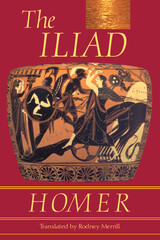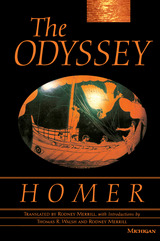3 books about Merrill, Rodney

A Californian Hymn to Homer
Timothy Pepper
Harvard University Press, 2010
Much as an ancient hymnist carries a familiar subject into new directions of song, the contributors to A Californian Hymn to Homer draw upon Homeric scholarship as inspiration for pursuing new ways of looking at texts, both within the Homeric tradition and outside it. This set of seven original essays, accompanied by a new translation of the Homeric “Hymn to Apollo,” considers topics that transcend traditional generic distinctions between epic and lyric, choral and individual, performed and literary. Treating subjects ranging from Aeschylus’ reception of Homeric anger to the representation of mantic performance within Early Islamic texts, the collection presents a selection of imaginative critical work done on the West Coast by scholars of antiquity.
[more]

The Iliad
Homer
University of Michigan Press, 2007
"Other competent translations of Homer exist, but none accomplish what Merrill aims for: to convey to the reader-listener in translation the meaning and the sounds of Homer, coming as close as possible to the poetry of the original. Merrill accomplishes this virtuosic achievement by translating Homer's Greek into English hexameters, a process requiring not only a full understanding of the original Greek, but also an unusual mastery of the sounds, rhythms, and
nuances of English."
---Stephen G. Daitz, Professor Emeritus of Classics, City University of New York
nuances of English."
---Stephen G. Daitz, Professor Emeritus of Classics, City University of New York
Rodney Merrill's translation of Homer's Iliad offers a form of English poetry particularly relevant to the epic, producing a strong musical setting that brings many elements of the narrative truly to life. Most notable are the many battle scenes, in which Homer's strong dactylic hexameters make credible the "war-lust" in the deeds of the combatants.
Until his retirement, Rodney Merrill taught English composition and comparative literature at Stanford and Berkeley. In addition to his translation of Homer's Odyssey, he is the author of "Chaucer's Broche of Thebes."
[more]

The Odyssey
Homer
University of Michigan Press, 2002
The Odyssey is considered to be one of the greatest pieces of world literature. Its basic story--the homecoming of Odysseus--is widely known. Although it has often been translated, earlier versions do not give the reader the full sense of its oral epic nature as a song that came into being through a long tradition of sung performances before writing was widely practiced. When finally written down, it retained its oral-formulaic nature in ways that are clearly discernible, and which this translation successfully captures. Rodney Merrill strictly adheres to the use of dactylic hexameter, the meter by which the formulaic language of Homeric poetry is rendered as musical phrasing rather than as a simple repetition of ideas. Reading this version--especially aloud--will grant both students and teachers fresh insight into the nature of Greek epic and Homer's song about one of the most famous characters of all time.
This epic began life as the music composed by a "singer of tales," not as words on a page. As such, its meter allows for pleasing variations with a strong basic "beat," thus providing a rhythmic impetus that carries the story swiftly forward. The resulting "music" has important repercussions for the reader's perception of the many repeated elements that provide structure for the poem and bring out significant themes, just as the repetitions in a piece of music do.
This edition of the Odyssey includes selections for further reading, a list of proper names (with a guide to pronunciation), and three maps. It also provides introductory discussions of how the work came into being and was transmitted until it became the work we read, how it is divided into six "performance sessions" of four books each, and how the poem's various themes are developed. Rodney Merrill's Odyssey is thus an ideal edition for students, teachers, and general readers.
The audiobook is available on twelve cassettes, and is read by Rodney Merrill. This version will bring Homer's epic masterpiece to life like never before. Perfect for the car or classroom!
Rodney Merrill is retired and an independent scholar. He has taught at Stanford University, the University of San Francisco, and the University of California, Berkeley.
Thomas R. Walsh, Senior Professor at Occidental College, has written articles on Homeric poetics, with a forthcoming book on anger in Homer.
This epic began life as the music composed by a "singer of tales," not as words on a page. As such, its meter allows for pleasing variations with a strong basic "beat," thus providing a rhythmic impetus that carries the story swiftly forward. The resulting "music" has important repercussions for the reader's perception of the many repeated elements that provide structure for the poem and bring out significant themes, just as the repetitions in a piece of music do.
This edition of the Odyssey includes selections for further reading, a list of proper names (with a guide to pronunciation), and three maps. It also provides introductory discussions of how the work came into being and was transmitted until it became the work we read, how it is divided into six "performance sessions" of four books each, and how the poem's various themes are developed. Rodney Merrill's Odyssey is thus an ideal edition for students, teachers, and general readers.
The audiobook is available on twelve cassettes, and is read by Rodney Merrill. This version will bring Homer's epic masterpiece to life like never before. Perfect for the car or classroom!
Rodney Merrill is retired and an independent scholar. He has taught at Stanford University, the University of San Francisco, and the University of California, Berkeley.
Thomas R. Walsh, Senior Professor at Occidental College, has written articles on Homeric poetics, with a forthcoming book on anger in Homer.
[more]
READERS
Browse our collection.
PUBLISHERS
See BiblioVault's publisher services.
STUDENT SERVICES
Files for college accessibility offices.
UChicago Accessibility Resources
home | accessibility | search | about | contact us
BiblioVault ® 2001 - 2024
The University of Chicago Press









